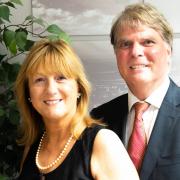The industrial and domestic cleaning industry is growing, and world-leading cleaning technology company Kärcher is mopping up a larger proportion of the market

Simon Keeping hails from a Dorset farming family and would have loved to remain in the sector, but with his father one of eight siblings, there wouldn’t have been much farm left if it had been carved up between them. He graduated with a degree in economics from Nottingham and moved into marketing. Before joining Kärcher, Simon worked in corporate America. This included 14 years with 3M in the UK, Europe and the US. He was European marketing director of American business, Brady Corp, before becoming its UK managing director. Eleven years ago he was headhunted for his current role at Kärcher. However, you might be able to wrench a farmer’s lad off the farm, but you can’t take the farmer out of the man and Simon‘s maintaining his love of farming by keeping horses and pigs at his home in Oxfordshire and participating in country sports. The family farm in Dorset is also still used occasionally for demonstrations. His job takes him away from home for up to four months a year, but he’s made sure that when he’s back he spends time with his family. Together, this adventure-loving family took up kayaking with his a few years ago. “It’s a brilliant way to keep fit and enjoy life.
Cleanliness is next to godliness, we’re told. It certainly is at Kärcher, which makes pressure washers, steam cleaners and more for the professional and domestic markets. The company has twice steam-cleaned Rio de Janeiro’s iconic Chris the Redeemer statue. The company has also helped preserve the Colossi of Memnon in Egypt, and given the Statue of Liberty in New York a thorough wash.
Closer to home, Banbury-based Kärcher has also cleaned the London Eye. All this grand scale spring-cleaning is part of its ‘cultural cleaning’ programme where the company, one of the world’s leading suppliers of cleaning equipment and technology, showcases what its equipment is capable of, because even the most iconic sculptures and buildings are prone to mildew, bird poo or just general environmental stains
Financially, Kärcher is also cleaning up. Worldwide the company has 11,000 employees, and turned over €2.12 billion in 2014, £125 million in the UK. According to Simon Keeping, the company’s Region CEO responsible for the UK, Ireland, Australia, New Zealand and South Africa, the UK’s aim is to be a £200 million business by 2020. It is currently the fourth largest subsidiary of the company after Germany the USA and France.
As well as sprucing up big international installations, Kärcher has run a national campaign called Kärcher Cleans Britain. Community groups nominate themselves on Facebook and a crack cleaning team will arrive and blitz a village hall, nursery or other nominated community buildings. The company even ran a campaign aimed at the farming community, called Kärcher Mucks In.
These fun campaigns successfully promote a great brand in a growing industry. In 2016 Kärcher will move into 84,500 sq ft of new UK headquarters currently being constructed at Banbury Point, Banbury, close to Junction 11 of the M40. This will be almost double the size of its current base on Beaumont Road and will include offices, an academy, retail centre and training facilities as well as a warehouse and workshop allowing for further expansion. The old Banbury HQ is up for sale.
Kärcher celebrated its 80th anniversary last year. It has been based in Banbury since 1978, growing from an eight strong team to the current 296 roster of staff.
“Kärcher may be big, but it’s still a family business, so it’s important that we all feel a part of the business and take pride in what we do,” says Simon
He added: “This new headquarters will be a very different environment and will reflect the advances the company has made and our plans for the future.”
Half of Kärcher’s business is in the domestic cleaning market; you’ll find Kärcher pressure washers, floor polishers, watering systems and window vacs in all good DIY stores. But there is plenty of opportunity to grow within the market. “We still only have one third of UK household penetration in the pressure washing business. In some of the more mature markets of Germany, France and Benelux, Kärcher product penetration is 50%,” says Simon. “Simply by growing awareness and preference there is new business, and every few years we’ll come out with innovations which gives us new opportunities for growth.”
When Simon joined the company 11 years ago, it was heavily reliant on domestic pressure washers. These were largely a spring purchase when suburban Britain took its first tentative steps outside the front door after winter and winced at the damage done by moss, lichen and environmental wear. “Now half our consumer products are indoor. We have sold three million window vacs in the UK over the last three years.”
On the industrial side, Kärcher provided the machines that cleaned London’s Olympic venues in 2012. It cleans the streets of Westminster, sells pressure washers to farmers and scrubber dryers to Tesco.
There’s a lot of innovation going on in the industry too. Across the business in Europe, Asia and the US it has 650 development engineers coming up with ideas. “We spend time in early development researching customer needs,” says Simon. “From farmers and hospitals to hotels and domestic customers. The needs of a hotel and a hospital are closely aligned, but clearly they are very different from the needs of a milking parlour.”
Simon predicts operator-free cleaning will become a reality within the next 10 years: Imagine Kärcher cleaners whizzing through shopping malls at the dead of night.
“Our industrial customers often bought scrubber driers that cleaners walked behind or rode on. Now we’ve introduced stand-ons. This is a great compromise. Many companies don’t like ride-on machines because they think it turns the cleaner into Lewis Hamilton. And quite often a cleaner who is small in stature has difficulty seeing over a big machine if they are sitting down.”
The company is also a serious player in the vehicle wash industry. About a third of all buses and trucks, including Eddie Stobart lorries, will be cleaned in a Kärcher gantry wash.
However, with water a contentious and hugely valuable resource, should we all be using pressure washers where previously a mop and bucket would have sufficed?
Apparently pressure washing is a lot less wasteful than hosepipes. “Depending on the job, using a pressure washer is between 50-80% more economical with water,” says Simon. “We had to educate the water authorities that we were not the bad guys. We now have ‘Waterwise’ recognition on our domestic machines, while our commercial floorcare solutions feature on Defra’s Water Technology List.”
In fact, environmental awareness is embedded in Kärcher’s DNA, he says. “We just do it and perhaps don’t talk about it as much as we should. Our pressure washer is 93% recyclable and our machines are fuel efficient.”
Much of Kärcher’s professional business is through contract cleaners. So much so that it recently bought Clean Sweep, a Manchester based hire company. “They were using our machines for every hire,” says Simon. “Contract cleaners are having a tough time of it with margins being squeezed, so for them it can be cheaper to hire, not buy, one of our machines.”
One of the most impactful things for Kärcher’s UK business over the next 12 months, both domestic and industrial, is likely to be the introduction of the living wage. “This is fantastic for ensuring Britain’s workers are fairly paid but it could force the contract cleaning sector to look more closely at productivity,” he says. “If labour becomes more expensive contract cleaning companies will have to look at more machinery. On the retail side, it could mean that people will have more money in their pocket.”
Alfred Kärcher was an inventor and entrepreneur living in Stuttgart. In 1935 he established his own heating technology business, selling products he invented. After the Second World War, the company provided steam cleaning for the US air force based in Germany, however it was in 1950 that the inventive Alfred made his breakthrough in cleaning technology with the development of the first European hot water high-pressure cleaner (the DS 350 steam jet).
After Alfred’s untimely death, aged just 58, his inspirational wife, Irene, a director’s assistant at Mercedez Benz (also based in Stuttgart, a hub of automotive technology even today), wasn’t about to see her husband’s brilliance go to waste. She took over the business and began its inexorable growth creating a brand new market, with the world’s first high-pressure cleaner for private households in the process. Today the family continue to set the tone and values of the business, protecting Kärcher as a family business for the next generation



























